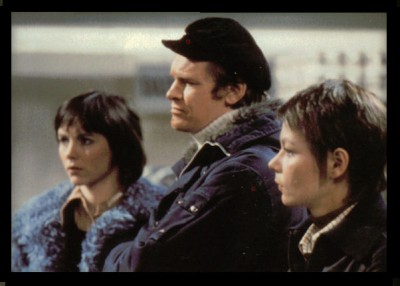| Reviews & Columns |
|
Reviews DVD TV on DVD Blu-ray 4K UHD International DVDs In Theaters Reviews by Studio Video Games Features Collector Series DVDs Easter Egg Database Interviews DVD Talk Radio Feature Articles Columns Anime Talk DVD Savant Horror DVDs The M.O.D. Squad Art House HD Talk Silent DVD
|
DVD Talk Forum |
|
|
| Resources |
|
DVD Price Search Customer Service #'s RCE Info Links |
|
Columns
|
|
|
Survivors: The Complete Original Series
To my great surprise, Survivors in fact is extremely sober, intelligent, and adult. It reminded me most of Douglas Livingstone's superb (and scary) miniseries adaptation of John Wyndham's The Day of the Triffids (1981). Survivors is a bit less grim and pessimistic, but it too pulls few punches, at least in its first year.
Survivors ran three seasons/series, ultimately raking up thirty-eight 55-minute episodes. One of the problems facing DVD reviewers trying to look at these Complete Series sets is not having enough time to look at everything. I watched the first 10 or so episodes during the three weeks I've had the set, but that alone is enough for me to recommend it, even though writers more familiar with the show like John Sinnott, in his excellent review of the program point out that the quality of the writing declined during its second and especially third seasons.
Undoubtedly, this release is timed to coincide with yet another sci-fi series re-imagining, all the rage since the successful revivals of Battlestar Galactica in the U.S. and Doctor Who in the United Kingdom. However, just as the 2009 remake of Day of the Triffids failed to impress audiences, so too apparently did the 2008 remake of Survivors, which struggled through two short series before its ignominious cancellation.
The set comes in paperback novel-sized packaging with, unfortunately, more than 31 hours of material crammed onto just six DVDs (three DVD-18s, two DVD-14s, and one DVD-9) which themselves are packed so tightly into place as to completely obscure the program's episode guide, rendering it all but inaccessible. Fortunately, the discs seem to play without any problems, unlike Universal's disastrous DVD-18 TV releases of about five years ago.
Over disquieting opening titles, Survivors' premise is immediately established, as a globetrotting scientist* accidentally unleashes a worldwide pandemic that first exhibits flu-like symptoms but which, unknown to the general population at first, kills 99% of those who contract it within a few days. By the time the disease runs its course just one in 10,000 survive.
In Britain there's growing concern, but also a false sense of complacency that scientists and the government will soon solve the problem. Over the first few episodes, the main characters are introduced: In an upper-class suburb, Abby Grant (Carolyn Seymour) initially believes that she's far enough from London that she won't be affected by the pandemic. However, the disease soon sweeps her countryside community, killing her husband (Rumpole of the Bailey's Peter Bowles). In a clever touch, Abby becomes feverish and bed-ridden first, emerging from her sick room days later to find her husband dead on the sofa, food rotting on the kitchen table, no electricity, etc. She sets out in search of her young son, Peter, who had been quarantined at his private school.
In London another young woman, Jenny Richards (Lucy Fleming), flees the city on foot, on her own, following the death of her roommate. She's among the rare exceptions that didn't get sick at all. Days, perhaps weeks later she runs into Jenny, who has been joined by Greg Patterson (Ian McCulloch), an engineer who flew back to Britain from across the channel. Later still two children also join their group: John (Stephen Dudley) and Lizzie (Tanya Ronder).
Various scattered survivors begin hoarding non-perishable foodstuffs and other supplies, but Abby especially realizes that such things won't last long. The process of making items as simple as a candle and matches will have to be relearned, luxuries taken for granted in the modern world now must be carefully considered and rationed or retooled for the new, post-apocalyptic one.
And then there is society itself. In an early episode Abby runs into a self-appointed emergency local government established by Arthur Wormley (George Baker). Abby is horrified by their despotic ambitions masquerading as democracy, but also wonders if such cruel measures aren't necessary for the survival of the human race. (Numerous early episodes confront complex issues such as capital punishment.) She and the others decide to establish their own, freer society but with an emphasis on starting over rather than preserving and rationing what remains.
The series has a strong "What would you do in a situation like this?" appeal, and works really well in the way it reminds viewers how radically things would change almost overnight, how technologies and complex industrial processes we've come to rely upon would instantly vanish. Some particulars don't ring true; for instance, there's little widespread panic as the scale of the pandemic and its effects become clear, and one show about rabid dogs is laughable because the merry little pooches hired to play the central menace are anything but frightening, but other grim issues are treated realistically. The series is generally pessimistic about the human race but conversely optimistic that its intelligent little band of main characters has a chance to establish their own pocket of humanity.
Some have criticized the show's post-apocalyptic world as too sanitized, too clean, but that's less an issue than its occasional class stereotypes, though perhaps accidentally in some ways this may not be unrealistic. (One early show is highly critical of a wealthy woman's attempts to hoard supplies so that she can hire "help" to serve her.) A bigger problem is that the show's producer stupidly fired Survivors' most interesting character and upset a carefully nurtured, rich dynamic among the regular cast.
Another facet of Survivors that impressed me was that it's a weekly series which unfolds at the novel-like, leisurely pace of a television miniseries. The main characters are introduced very gradually, and in such a way that it's not clear who's going to survive the early episodes and who's going to die, who's going to take charge and who's going to fall to pieces. If this were a '70s American show everything would have been plainly established in the pilot film, with neatly self-contained, repetitive stories in the weeks ahead. By series two, the main characters shift about, some disappearing while others, notably Charles Vaughn, the leader of a community of survivors, take over. (Denis Lill, who plays him, is another Rumpole veteran, who played Mr. Bernard on that show.)
The show was briefly a phenomenon in its native Britain, and its high ratings and Nation's reputation probably account for its fairly lavish, more than adequate production values. It falls into the realm of intimate epic, showing the effects of a global catastrophe on a small group of people, but the show doesn't look cheap.
Video & Audio
As with other BBC shows of the period, Survivors was produced on videotape for studio interiors, and on 16mm film for exteriors, the latter accounting for about 60-70% of the average episode. (Later shows rely on videotape throughout.) The BBC and 2entertain have done a fine job maximizing this severely limited format's potential, with the image looking pretty good most of the time.
Those with region-free DVD players may want to consider purchasing the Region 2/PAL edition, which at the time this review was written was marked down to £17.94 (about $25.83 vs. a $79.98 SRP in the States), and is presented on 11 single-sided discs instead of six (mostly) double-sided ones, and includes far more extra features (audio commentaries, etc.). The mono audio is fine and includes optional subtitles. As usual, the set is preceded by BBC America's extremely grating commercials and dire warnings to its customers, all potential thieves.
Extra Features
Other than photo galleries, the only real extra here is the half-hour "The Cult of Survivors" (2006), featuring recollections by the cast and crew. It's entertaining if way too short for something like this.
Parting Thoughts
This intelligent, adult science fiction drama is a real surprise and not at all what I expected. Though pretty bleak it's compulsively watchable, almost always interesting and frequently thought-provoking. While pointlessly offered in a heavily compromised edition versus its UK counterpart, this Complete Series set is definitely worth one's time. Highly Recommended.
* Wikipedia describes the scientist as Asian, but I think his race/nationality is deliberately inconclusive. The character could be white, Asian, or Hispanic (among others), Chinese, Russian, or even American or British.
Stuart Galbraith IV's latest audio commentary, for AnimEigo's Musashi Miyamoto DVD boxed set, is on sale now.
|
| Popular Reviews |
| Sponsored Links |
|
|
| Sponsored Links |
|
|
| Release List | Reviews | Shop | Newsletter | Forum | DVD Giveaways | Blu-Ray | Advertise |
|
Copyright 2024 DVDTalk.com All Rights Reserved. Legal Info, Privacy Policy, Terms of Use,
Manage Preferences,
Your Privacy Choices | |||||||
















